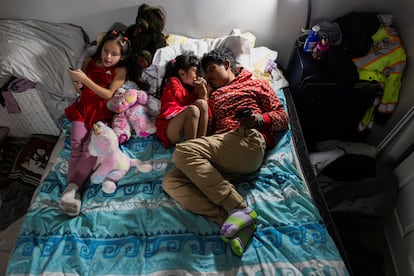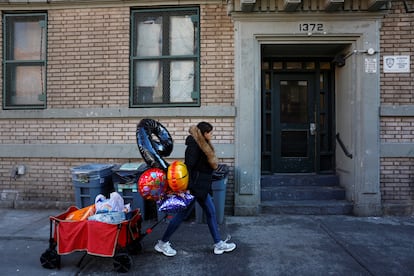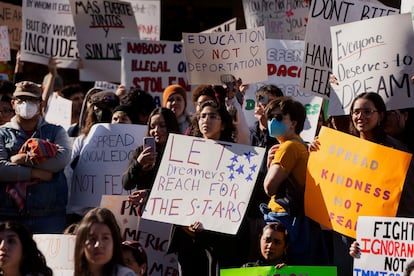Thousands of children are afraid to go to school amid deportation threats: ‘If one day I don’t come to pick you up from the bus, don’t cry’
Widespread fear is gripping immigrant families following recent ICE raids and the Trump administration’s immigration policies. Many parents are keeping their kids home to avoid possible separation


Eva and her seven-year-old son had their most serious conversation about the matter a week ago. It was exactly the talk she hoped to never have with him. But the little boy had been asking for days about what was going on, why they were detaining people on TV and taking them away.
“Baby, we don’t have papers, we weren’t born here and they’re getting us. If that ever happens to us, baby, if one day I don’t come to get you from the bus, don’t cry, your aunt is going to send you to Mexico with me,” she tells him.
Eva’s heart clenches when she sees the child off. He leaves his home in the Bronx on the school bus at 6 a.m. and doesn’t return until 6 p.m. At 16 years old, her eldest daughter has a rough idea of what deportation means — that men load people like them onto trucks and take them back to the place it took so much to leave for them to leave two years ago. She has asked her mother if she can stay home from school. Eva sometimes gives into the request. Last week, she let her kids skip two days’ worth of classes.
“When I send them to school, I pray to God because we don’t know what’s going to happen. But I tell them they have to go, because the school keeps track of absences, and it affects their grades. They ask me, ‘What happens if they catch me, Mom? What do I say?’ And I tell them, ‘Well, don’t say anything. Don’t talk,’” she says.
Nothing, at first glance, indicates that New York is a different city than it was a month or a year ago. Passers-by stop on Fifth Avenue a take photos of the gigantic suitcases of the Louis Vuitton building that barely fits in their phones’ cameras. Here’s the disheveled man who was once an award-winning chess teacher and now charges $5 a game in Washington Square Park. There, a young graduate who wants to spend some time working as a waitress at an Upper East Side bar.
But there’s a sense of sadness here that not all perceive, a fear that the passers-by, the former chess teacher and the young waitress may not notice, but which is felt by the florist on a Bushwick corner who lets you buy a bouquet on credit one day, who even slips you an extra bloom as a gift. It’s felt by the delivery guy who ferries dozens of McDonald’s orders during each shift, and the Nahuatl-speaking woman who sells tacos dorados and chicharrones in green salsa on a street in Jackson Heights.

How could they not be, after seeing the photos that were shared on WhatsApp, taken in Corona, Queens of a federal officer stopping cars to demand documents, or of the agents who were spotted skulking along Flatbush Avenue? How could they not be, after The New York Times reported that an “immigration operation” in New York City and Long Island yielded a record-breaking 39 ICE detentions in one day? How could they not be, when many of them are parents, and the news says that Donald Trump has given the green light to federal agents to raid schools?
Trump had only been president for a few hours when the director of the Department of Homeland Security, Benjamine Huffman, announced that he would allow U.S. Immigration and Customs Enforcement and Customs and Border Protection agents to enforce immigration law in so-called “sensitive” areas. “Criminals will no longer be able to hide in America’s schools and churches to avoid arrest,” he said in a statement, making it clear that places once considered “sanctuaries” would no longer impinge on the Republicans’ plan to remove millions of migrants from the country.
Several cities have responded that they will not be collaborating with the federal government on these kinds of raids. From Los Angeles to Chicago, school authorities declared their opposition to the persecution of undocumented students. In Denver, the city’s public school district announced that it was “committed to providing equitable and inclusive environments where all students feel safe and supported, regardless of immigration status.” Still, throughout the country, parents live in fear of sending their kids to school.
The New York City Department of Education — which oversees the schooling of some 48,000 undocumented students, whose families have been migrating to the state in greater numbers since the beginning of the summer of 2022 — voted for a resolution reaffirming support for undocumented students. Its policy restricts collaboration with ICE agents, preventing them from entering classrooms unannounced and without a warrant.
A few weeks ago, Melissa Avilés Ramos, the New York City Schools chancellor, pronounced her unwavering commitment to protecting students. “I know firsthand how important it is that our schools are safe places for our kids. We are committed to protecting the right of every student to attend public school, regardless of immigration status, national origin, or religion,” she posted on X.

A guide for public school principals to police and immigration authority actions in New York schools makes it clear that “non-local” law enforcement officials, including those from ICE, can only gain access to school facilities with proper warrants and under “exigent circumstances”.
“Schools are one of the safest places for students”
Eduardo Antonetti, senior director of advancement and advocacy at Internationals Network for Public Schools, which supports 17 schools in New York’s five school districts and works with immigrant and refugee students, tells EL PAÍS that, “although the current climate is characterized by fear and uncertainty,” immigrant parents and children who are fearful of attending school should stay “calm, because the Department of Education of the City of New York, and a wide range of community organizations, including our own, are dedicated to guaranteeing that students are safe, that they’re welcome, and that they come to school.”
“Schools are one of the safest places for students,” says Antonetti, who advises parents to get into contact with the principal or parent coordinator at their child’s school to get informed on current protocols; make sure that their school has an updated list of emergency contacts, in case parents or caretakers are detained or are not available; consider the possibility of drawing up plans for legal guardianship for their children as a precautionary measure in case the family is separated; and to consult with a lawyer if they have doubts as to their immigration status.
Recently, New York Mayor Eric Adams was asked at a public appearance about the fear that many kids currently have of attending school. “Children should go to school. And we are going to stand up for all New Yorkers, documented, and undocumented,” he said. Still, the mayor’s recent behavior — he’s indicated his willingness to collaborate with “border czar” Tom Homan, and with the Republican administration’s immigration policy — has led many to fear for their safety in New York.

Mrs. P. — whose 15-year-old daughter asked her not to make her name public out of fear that the authorities would come after them — did not send her children to school last week. She’s not the only parent who made that decision in the face of an avalanche of headlines about raids and deportations taking place across the country. Although there is no exact data on how many have kept their kids home, figures from the Department of Education show that on the second and third days after Trump’s arrival at the White House, New York schools had an 80% attendance rate.
“My 12-year-old boy didn’t go,” says Mrs. P., who had to sit down with her son and daughter to explain what was happening across the country. “I had to tell them what was happening. I warned them about what they were going to see on TV and what they were going to hear from their schoolmates. It’s very sad. My little girl understood. She said, ‘If they send us away, we’ll all go together.’”
A few days ago, Mrs. P.’s youngest son confessed that he was afraid to go to school because one of his classmates, who came from Ecuador with his parents, told him that “he might have to go because he wasn’t born here.” When he got back to his house, which is located in Queens, the little boy asked his parents if the same thing was going to happen to them, if they were going to have to go back to Guerrero, Mexico, or if his greatest fear would take place: that one day he’d go to school, and upon returning home, his parents would no longer be there.
“My boy asked me not to go to work, he said that Trump was going to get all of us. I told him, ‘Don’t be afraid, I’ll be back,’” says the woman, who came to the city 19 years ago and has spent the last nine working as a babysitter for a New York family. “I sat down with them, I told them that we have to go to work to pay for rent and food.”
The woman, who blesses her children every morning before they leave for school, also explained that if one day, they arrive and Mom and Dad aren’t home, they should not be afraid. She has complete trust in her clients, and has given them power of attorney so that if she and her partner are deported, the children can be taken to Mexico. She has also told her kids that if they do come into contact with ICE officers, they should not sign any documents. “If they take you away or detain you, know that Mom and Dad will do everything they can to get you out of there.”
Translation by Caitlin Donohue
Sign up for our weekly newsletter to get more English-language news coverage from EL PAÍS USA Edition
Tu suscripción se está usando en otro dispositivo
¿Quieres añadir otro usuario a tu suscripción?
Si continúas leyendo en este dispositivo, no se podrá leer en el otro.
FlechaTu suscripción se está usando en otro dispositivo y solo puedes acceder a EL PAÍS desde un dispositivo a la vez.
Si quieres compartir tu cuenta, cambia tu suscripción a la modalidad Premium, así podrás añadir otro usuario. Cada uno accederá con su propia cuenta de email, lo que os permitirá personalizar vuestra experiencia en EL PAÍS.
¿Tienes una suscripción de empresa? Accede aquí para contratar más cuentas.
En el caso de no saber quién está usando tu cuenta, te recomendamos cambiar tu contraseña aquí.
Si decides continuar compartiendo tu cuenta, este mensaje se mostrará en tu dispositivo y en el de la otra persona que está usando tu cuenta de forma indefinida, afectando a tu experiencia de lectura. Puedes consultar aquí los términos y condiciones de la suscripción digital.








































